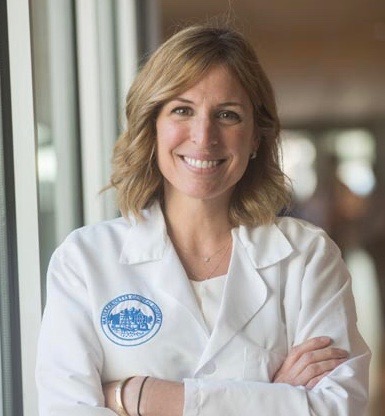
Her Medicine Begins with Caring
By Kerry J. Bickford, VOICES Editor
A typical day for Dr. Laura Kehoe begins long before her workday starts. In addition to her job as medical director of Massachusetts General Hospital’s Bridge Clinic, she is the mother of two teenagers and a pre-teen, so she and her husband, Eric, a middle school teacher, tag-team to get everyone’s day started. Once that is done, she heads into Boston, and her real workday begins.
When Dr. Kehoe completed her residency at MGH in 2001 and began practicing internal medicine, she cared for many patients with substance use disorder (SUD). The FDA had not yet approved suboxone, so she treated them with “sympathy and peer support and sometimes a referral for methadone,” but that posed many barriers for patients and felt inadequate. By 2003, Dr. Kehoe became waivered to prescribe buprenorphine and had become somewhat of a local expert in the field of addiction medicine. She and a staff nurse worked together on an expanded model known as office-based addiction treatment. OBAT, as it is known, was being developed by integrating addiction treatment into primary care, which was highly successful. In addition to her work at Mass General, Dr. Kehoe became the director at Bay Cove Methadone Maintenance Treatment Program in Boston and also practiced at Right Turn in Watertown. Right Turn is described as somewhat of a boutique addiction practice with a multidisciplinary component that combines the mind-body-heart-soul and spirit with creative self-expression.
As she continued to practice, Dr. Kehoe listened and learned from her patients, who became her “best teachers” while becoming board certified in addiction medicine. She describes finding her niche and becoming passionate about advocating for and changing the stigmatization of people who were suffering from a very “treatable illness.”
“The vast majority of my patients with substance use disorders show up alone. Addiction is a disease of isolation and deep shame, for which patients are conditioned to keep symptoms or relapse hidden for fear of letting down their loved ones or of being rejected,” Dr. Kehoe added.
The homelessness crisis was pushing more people through her doors who were scared and in need of treatment, and it was her mission to get them through that door with quality, evidence-based care, kindness, and sometimes even a hug. Dr. Kehoe became increasingly focused on harm reduction along with reducing the criminalization and inferior treatment of this underserved population. She began hiring people to fit the current mission of her “amazing team” at the Bridge Clinic and has never looked back.
Along with the significant movement toward humanizing and destigmatizing addiction, there inevitably comes tragedy and loss. Sometimes the system fails those with substance use disorder, and other times the illness does. Either way, Dr. Kehoe’s team processes each death together and supports each other when one of their patients dies. Their compassion for the whole person, not just the patient, makes grieving each and every loss a necessity.
At the memorial service of one of her patients, Dr. Kehoe said it best: “To be trusted as someone’s physician is an incredible privilege. He (the patient) taught me the importance of weaving the art and science of medicine together with threads of compassion and empathy. No medical education, training or years of practice, however, could have prepared me for today.” Her grief was genuine, and she says it motivates her to advocate for changes and policies that might help someone else. “It never gets easier,” she said solemnly. “But there is much hope if we keep the pressure on to expand immediately accessible, science-driven and patient-centered substance use care as we do for every other illness we treat in medicine. People who use drugs deserve the same type of respect and care.”
As parents, Dr. Kehoe says she and Eric talked early and often to their three growing children about substance use. They all know what their mother does for work, and she has taught them, the way her parents taught her, about destigmatization. She recalls witnessing empathy in action when she was young by going with her mother, who volunteered at shelters and teen drop-in centers, and by watching her attorney father advocate for fair trials for his clients. Dr. Kehoe speaks with great humility about listening to other parents and learning from anyone she can, despite her extensive expertise on substance use. Like the rest of us feel about our own children, she just hopes the foundation she and Eric have laid is enough to help her kids feel firmly grounded when confronted with their choices. She encourages them to ask questions, and they know the door is always open to discuss anything of concern.
On a recent day at the Bridge Clinic, a patient arrived a little early, and the team was not ready to see him. They quickly put their heads together and reached into a closet that contains a stack of donated food gift cards, warm clothing, new socks, and other items. “Go get something to eat, and we will be ready when you come back,” they promised.
In another circumstance, the patient might have left and never come back, but the cheerful faces of Dr. Kehoe and her upbeat staff and the extra effort they take to let people know they care are just enough for someone who is scared to want to return. Her compassion for the most marginalized human beings and desire to make each one of them know that they matter keeps them coming, and there is no doubt that Dr. Kehoe is making an enormous difference, one life at a time.
